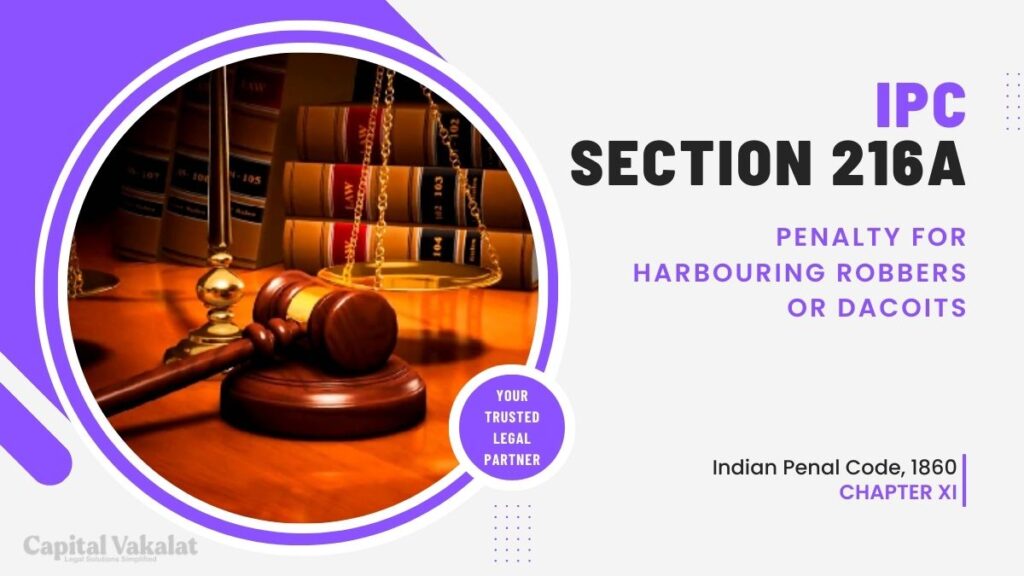In this comprehensive article, we’ll delve into the intricacies of Section 216A of the Indian Penal Code (IPC), which deals with the penalty for harboring robbers or dacoits. This legal provision has far-reaching implications in the fight against organized crime and plays a pivotal role in maintaining law and order. We’ll explore the various aspects of this section, understanding its significance, the conditions under which it is applied, and the penalties that can be imposed. So, let’s embark on this legal journey to gain a deeper insight into Section 216A IPC.

Section 216A of the Indian Penal Code (IPC) stands as a formidable deterrent against those who choose to aid and abet individuals involved in criminal activities, particularly robbers and dacoits. This article aims to shed light on the provisions of this section and its far-reaching consequences for those who engage in harbouring such offenders.
The Genesis of Section 216A IPC
Section 216A was incorporated into the IPC in 1973, recognizing the need for stringent measures to combat organized crime. The intention was to penalize individuals who provide refuge, support, or protection to robbers and dacoits, thereby facilitating their criminal activities.
Defining Robbers and Dacoits
Robbers and dacoits are pivotal terms in this context. Robbers are individuals involved in theft using force or the threat of force, while dacoits typically operate in organized groups, commit violent crimes, and often target rural areas. It’s important to distinguish between these terms as Section 216A applies to both.
Acts Constituting Harbouring
Harbouring, as per Section 216A, encompasses various acts that involve hiding, protecting, or aiding robbers or dacoits. This may include providing them with shelter, food, or any form of assistance that aids them in evading the law.
Intent Behind Harbouring
It’s crucial to understand that the intent behind harbouring is a critical element in applying this provision. Merely unknowingly hosting a criminal may not lead to prosecution. The intent to support their unlawful activities must be proven.
Provisions of Section 216A IPC
Punishment for Harbouring Robbers or Dacoits
If an individual is found guilty of harbouring robbers or dacoits, they can be sentenced to imprisonment for a term which may extend to seven years, in addition to a fine.
Cognizable and Non-Bailable Offense
Section 216A is a cognizable offense, meaning the police can arrest the accused without a warrant. Moreover, it is a non-bailable offense, making it even more stringent.
Consent of the Public Prosecutor
Before initiating a prosecution under Section 216A, the public prosecutor’s consent is required. This adds an additional layer of scrutiny to ensure that cases are not misused.
Landmark Legal Cases
State of Maharashtra v. Mohd Yakub
In this case, the Supreme Court held that harbouring involves active support or assistance, proving the intent to support the criminals. Mere knowledge of the presence of robbers or dacoits does not constitute harbouring.
State of U.P. v. Hari Charan
This case emphasized that the burden of proof lies with the prosecution. They must establish the accused’s active involvement in supporting the criminals beyond a reasonable doubt.
Significance of Section 216A IPC
Deterrence against Aiding Criminals
Section 216A serves as a powerful deterrent against those who might consider aiding robbers and dacoits. The stringent penalties associated with it discourage individuals from engaging in such activities.
Protecting Law Enforcement
By requiring the consent of the public prosecutor and making it a non-bailable offense, Section 216A safeguards law enforcement agencies against frivolous or mischievous cases.
Common Misconceptions
Some individuals mistakenly believe that mere knowledge of the presence of robbers or dacoits on their property could lead to prosecution. However, as highlighted in legal cases, active support and intent to aid are essential elements for prosecution.
Conclusion
Section 216A IPC stands as a robust legal provision, acting as a guardian of justice against those who choose to harbor robbers or dacoits. It plays a pivotal role in maintaining law and order and serves as a potent deterrent against aiding and abetting criminal activities. Understanding the nuances of this section is vital, not only for legal professionals but for society at large.
Frequently Asked Questions
Can the accused be granted bail in a case under Section 216A IPC?
Section 216A is a non-bailable offense, and bail is typically not granted easily.
What is the role of the public prosecutor in cases related to Section 216A?
The public prosecutor’s consent is required before initiating a prosecution under Section 216A, adding an extra layer of scrutiny.
How does Section 216A differ from aiding and abetting crimes in general?
Section 216A specifically deals with the act of harbouring robbers or dacoits and carries distinct penalties.
Are there any exceptions where harbouring may not lead to prosecution under Section 216A?
Exceptions may exist in cases where active support or intent to aid cannot be proven beyond a reasonable doubt. However, it is subject to the interpretation of the courts.